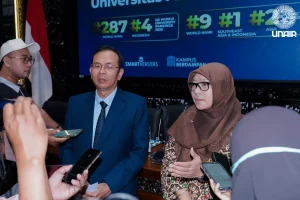UNAIR NEWS – Health is one of the sectors most affected by the Covid-19 pandemic. For this reason, the government has carried out a transformation in an effort to restore this sector. The Minister of Health (Menkes) of the Republic of Indonesia, Ir Budi Gunadi Sadikin, made this statement at the 2nd International Conference on Infectious and Tropical Disease (ICITD) 2023 In Conjunction with Clinical Microbiology Continuing Medical Education (CM-CME). The Institute of Tropical Diseases Universitas Airlangga (UNAIR) organized the conference.
“Of course, the government has made improvements. We have designed a health transformation with six pillars,” said Budi on Saturday, November 18, 2023, at the Majapahit Auditorium, ASEEC Tower, Dharmawangsa-B UNAIR Campus.
The Six Pillars
In health transformation, Minister of Health Budi said there are six pillars. The six consist of the transformation in primary services, referral services, health resilience systems, health financing systems, health human resources (HR), and health technology.
The six pillars will be implemented in several actions, for example, surveillance or supervision. This surveillance helps detect the presence of new pathogens, starting from the basic level, at community health centers (puskesmas).
“Of course, we have designed it; one of them is surveillance. Therefore, next year, the government will receive a special grant to build a network of public health laboratories to detect new pathogens starting from the community health center level,” he explained.

Minister of Health Budi also mentioned vaccines and their development technology as one of the health transformation strategies. The potential for a pandemic to emerge requires early vaccine research and development. The government will also increase the development of diagnostic tools and medicines, including a biotechnology center, to speed up pathogen detection.
“We will increase research and development also for diagnostic tools and medicines. “We are also currently building a Center of Biotechnology so that if there is a new pathogen, we can immediately detect it,” he said.
Roles of universities
Furthermore, Minister of Health Budi assessed that the government is not working alone in recovering from the COVID-19 pandemic. However, in this case, the government also involved universities, including UNAIR. UNAIR, he said, contributed significantly to making the Red and White vaccine for handling Covid-19.
Seeing this contribution, Minister of Health Budi saw that UNAIR had the potential to be directly involved in other developments. “UNAIR has already progressed with its vaccine. Well, I want more. Apart from vaccines, we also need other supports such as tools, reagents, and so on,” explained Minister of Health Budi.
In the end, Minister of Health Budi advised UNAIR to continue developing research through scientific discipline collaboration. Not only research he also hopes that UNAIR, together with other universities, can develop innovation to the downstream stage so that society can gain the benefits directly.
“UNAIR can collaborate with pharmaceutical companies, for example, to produce medicines if there is a new pathogen. I think the research capacity is already there; maybe later, it will need to be multidisciplinary to strengthen it. I hope it will not only go into research but also realization in society,” he emphasized.
Author: Yulia Rohmawati
Editor: Feri Fenoria









